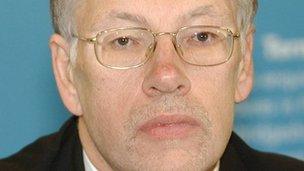Lord Bichard: Retired people could do work for pensions
- Published
- comments

Lord Bichard says fresh thinking is needed to help meet the cost of an ageing population
Retired people could be encouraged to do community work such as caring for the "very old" or face losing some of their pension, a peer has suggested.
Lord Bichard, a former benefits chief, said "imaginative" ideas were needed to meet the cost of an ageing society.
And although such a move might be controversial, it would stop older people being a "burden on the state".
The peer is a member of a committee investigating demographic changes and their impact on public services.
The panel was told that the transfer of wealth from young to old in the UK was the highest in Europe.
Lord Bichard, a former head of the Benefits Agency and top civil servant at the Education Department, who is probably best known for chairing the 2004 inquiry into the Soham murders, said the debate on rising healthcare and pension costs needed to be broadened out.
"Are there ways in which we could use incentives to encourage older people, if not to be in full time work, to be making a contribution?," he asked the rest of the committee.
"It is quite possible, for example, to envisage a world where civil society is making a greater contribution to the care of the very old, and older people who are not very old could be making a useful contribution to civil society in that respect, if they were given some incentive or some recognition for doing so."
'Tuition fees'
The 65-year-old crossbench peer, who has taken on a number of roles including the vice presidency of the Local Government Association and the chairmanship of a national after-school film club since retiring from the civil service in 2001, suggested the government should use the pensions system to "incentivise" retired people.
"We are now prepared to say to people who are not looking for work, if you don't look for work you don't get benefits, so if you are old and you are not contributing in some way or another maybe there is some penalty attached to that."
He asked: "Are we using all of the incentives at our disposal to encourage older people not just to be a negative burden on the state but actually be a positive part of society?"
Prof Martin Weale, a member of the Bank of England Monetary Policy Committee, said the proposal was "outside the normal range of what is discussed", but added it was an "interesting point".
Asked about his suggestion after the meeting, Lord Bichard said it was a new idea but he intended to look into it further as part of his work for the committee.
He acknowledged it would be difficult for politicians to sell to the public, but added: "So was tuition fees."
Childcare
Pensioners' rights campaigners reacted angrily to Lord Bichard's idea.
Dot Gibson, general secretary of the National Pensioners Convention, said: "This amounts to little more than national service for the over 60s and is absolutely outrageous.
"Those who have paid their national insurance contributions for 30 or more years are entitled to receive their state pension and there should be no attempt to put further barriers in their way."
Michelle Mitchell, director general of the charity Age UK, said: "Older people are a hugely positive part of society - over a third of people aged between 65 and 74 volunteer, a percentage that only drops slightly for the over 75s.
"In addition, nearly a million older people provide unpaid care to family or friends saving the state millions of pounds."
She added that almost a third of working age parents rely on grandparents to provide childcare - and more than 900,000 people are working past the traditional retirement age "either because they want to or because they can't afford to retire".
But she added: "We must not forget that retirement is a vastly different experience depending on your personal circumstances. For example, 40% of all people over 65 have a serious longstanding illness and 1.7m of our pensioners live in poverty.
"For many of those, retirement can be an unrelenting struggle of trying to survive on a low income in poor health."
Ros Altmann, director general of Saga, said: "This is a very strange idea indeed. Those who have retired have already made huge contributions to our society and are already the largest group of charity and community volunteers."
'Angry'
Prof James Sefton, of Imperial College, London, a former adviser to the Treasury, told the committee young people were effectively subsidising the older generation - and he could not understand why they were not protesting about it.
"I think they should be angry. I think the deal they are getting is poor," he told the peers.
"There are a lot of transfers going on within the system, from the young towards the old and I think awareness of it is very poor and I think eventually it will come out."
He said research he was carrying out at Imperial College, with Dr David McCarthy, suggested "the current generation are very heavy contributors to the public purse, whereas previous generations have benefited from the public purse".
This was mostly down to high house prices, high youth unemployment, rising public debt and the cost of education, added Prof Sefton, who is also a quantitative analyst at UBS bank.
The older generation benefits from public funds, in the form of healthcare and pensions, but younger people have to rely more on "private transfers" of wealth, such as family money, to a far greater extent than in other European countries, he added.
Update 26 October 2012: Lord Bichard has asked us to clarify that he was floating an idea at the committee rather than making a firm proposal. This report has been slightly amended to take account of that.
- Published12 October 2012
- Published18 September 2012
- Published12 September 2012